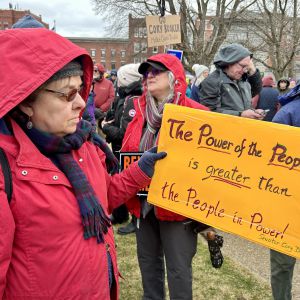As homelessness rises in New Hampshire, state and federal funding proposed for providers

Some of the candles in honor of the homeless people that died in 2022 at the Homeless Memorial Day Vigil. Monitor file
| Published: 02-01-2024 6:08 PM |
Homelessness is a complex issue in New Hampshire, compounded by a housing shortage and often exacerbated by mental health and substance abuse. But at the state and federal level lawmakers have a solution – provide funding to local agencies to help provide tailored resources.
On Wednesday, New Hampshire’s congressional delegation announced $12.8 million in funding for nonprofits and other local agencies that serve people experiencing homelessness.
And in the State House, Sen. Donovan Fenton, a Keene Democrat, introduced a bill to fund $5 million in a pilot program to support Community Action Programs and municipalities in addressing the current crisis.
“We have a homelessness issue here in New Hampshire,” said Fenton. “The program will address homelessness in specific communities based on their unique needs and populations experiencing homelessness.”
As homelessness is on the rise in New Hampshire – with over 6,000 people unhoused statewide, according to the NH Coalition to End Homelessness – agencies need flexible funding to meet client’s needs, said Fenton.
Often, state and federal funds come with restrictive uses. The pilot program proposed in Senate Bill 406, of which he is the prime sponsor, would provide flexible funding for these agencies to use as best they see fit.
For the five Community Action Programs in the state, a Request for Proposal will be issued to apply for funding.
Municipalities could use the funding also to finance homeless shelters, other lodging like hotel stays or provide incentives for landlords to house people experiencing homelessness, said Fenton.
Article continues after...
Yesterday's Most Read Articles
 ‘There was no oversight’: NH child advocate has been a watchdog for children's care. Now, the office is on the chopping block
‘There was no oversight’: NH child advocate has been a watchdog for children's care. Now, the office is on the chopping block
 Volunteer group wants to help homeless clean up their camp
Volunteer group wants to help homeless clean up their camp
 ‘Less finger pointing, more communication’: Longtime Chichester residents share hopes before second town meeting
‘Less finger pointing, more communication’: Longtime Chichester residents share hopes before second town meeting
 Casella Waste Systems’ landfill project in New Hampshire’s North Country denied permit
Casella Waste Systems’ landfill project in New Hampshire’s North Country denied permit
 New Healthy Buffalo owner to build market in Chichester
New Healthy Buffalo owner to build market in Chichester
 ‘It’s everything’: In largest rally yet, Trump protestors descend on Concord
‘It’s everything’: In largest rally yet, Trump protestors descend on Concord
“We want to help these individuals before they wind up in the shelter,” said Fenton. “Investing in homelessness prevention is a proactive strategy that can help individuals on the verge of homelessness to maintain stable housing.”
The amount of funds available for each municipality would be determined based on the number of people enrolled in Medicaid as of April 30. Program funding would also come from American Rescue Plan Act money, if available before general funds are utilized.
This state initiative, the Homeless Prevention Pilot Program, would complement state funding and other grants available to service providers.
Of the $12.8 million from the federal delegation, organizations in the Concord area received $7.6 million. Recipients include the Concord Coalition to End Homelessness, which received over $600,000 for their permanent supportive housing projects, the Community Action Program of Belknap and Merrimack County with $250,000 for their rapid rehousing program and the New Hampshire Coalition Against Domestic and Sexual Violence, which also was awarded over $300,000 for their rapid rehousing program.







 Henniker ponders what is a ‘need’ and what is a ‘want’
Henniker ponders what is a ‘need’ and what is a ‘want’ Boscawen residents vote to fund major renovation of public works building
Boscawen residents vote to fund major renovation of public works building ‘Voting our wallets’: Loudon residents vote overwhelmingly against $1.7M bond for new fire truck
‘Voting our wallets’: Loudon residents vote overwhelmingly against $1.7M bond for new fire truck In Pembroke, Education Freedom Accounts draw debate, voters pass budget
In Pembroke, Education Freedom Accounts draw debate, voters pass budget
